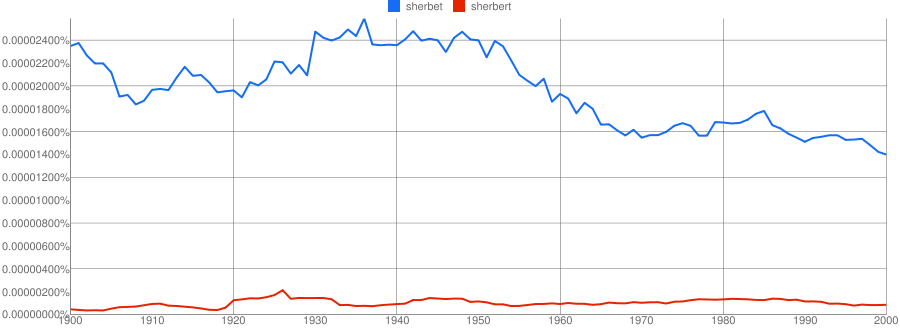This has often stumped me. Not being a world-traveler, I don't know how widespread this pronunciation is, but if anyone knows: where did the r come from?
-
1What about "sorbet"?– ThursagenCommented Jul 6, 2011 at 1:46
-
2You just blew my mind. I tend to be a pretty good speller but I would have sworn it was spelled "sherbert." I've always pronounced it that way -- no idea why.– redbmkCommented Jul 6, 2011 at 1:49
-
1I guess, it's due to pronouncing "sher-bət" "sher-bət", and then American rhoticism comes into play, and it becomes "sher-bərt"etc. Note that its pronounced "sher-bit" in England.– ThursagenCommented Jul 6, 2011 at 1:52
-
7Personally, I blame Herbert.– AscendantCommented Jul 6, 2011 at 2:03
-
2@crasic Sherbet has different meanings on different sides of the Atlantic. Over here (in the UK) sherbet is a fizzy powdery confectionary.– WaggersCommented Jul 6, 2011 at 7:59
3 Answers
I looked at spelling in print over the last century. This NGram chart gives the an exaggerated impression of the difference. Usage figures are 160,000 for sherbet, and 28,500 for sherbert.
That's more than 1 in 6 actually writing the r, almost certainly in contravention of what they'd find if they'd looked it up in whatever dictionary they had to hand. One could reasonably assume at least that fraction would say it that way, if not many more.
OP implies the less common form is simply 'wrong', but I see no reason to think this. It's just an alternative spelling associated with alternative pronunciation. So far as I can see, that alternative spelling has been around for several hundred years, so I guess the pronunciation has too.

-
Interesting. According to all the etymologies I've read, it's simply a mistake. But if it's been around for this long you'd think there would be some solid trace for the derivation. I would suspect Northern European but I don't see anything to back it up.– user8797Commented Jul 6, 2011 at 6:18
-
1@Sharon: Well it's true there's no second r in our translations of the 'original' forms - Turkish şerbet, Persian شربت (šarbat), Arabic شربة (shárba). But I don't see that means anything. It's like arguing about whether Peking / Beijing should be pronounced with a b or a p. These are foreign words that may get different approximate translations and pronunciations. Commented Jul 6, 2011 at 11:28
-
@Case 'According to all the etymologies I've read, it's simply a mistake.' gets very close to the etymological fallacy. Commented Mar 28, 2016 at 12:06
Two reasons:
- They first heard it that way. This is actually the more popular pronunciation in the US, even though it is incorrect.
- Sher-bet is harder to say because it requires a longer pause between the first and second syllable to bite off the "bet".
-
1My grandma pronounced it sherbert. Then I said I wanted some "sherbert" and my entire family laughed at me...But at least they bought me some after they made me cry! :) Commented Jul 6, 2011 at 3:35
-
2I heard, and thus said, "sherbert" when growing up. Eventually I saw the word written and realized something odd was going on. It's right up there with "i-urn" (iron) in my midwestern upbringing. Commented Jul 6, 2011 at 3:40
-
My family always pronounced it "sherbit"; I sometimes heard the extra-r pronunciation at school. But my ex-mother-in-law pronounced it "sherbert" (and "wash" as "worsh", and "sandwich" as "sangrich"...) and after a while I found it infecting my own pronunciation. Eewwww.– MT_HeadCommented Jul 6, 2011 at 9:26
-
5I'm not convinced it means much to suggest any particular form is 'harder to say'. The one you grow up with is invariably 'easier to say', I think. Even those [few, in my experience] people who pronounce Wednesday as it's spelt probably think that's 'easier', though I find it extremely difficult to do this even by way of speaking it as an example. Commented Jul 6, 2011 at 15:13
Another very similar example is the pronunciation perservere for the standard persevere.
This is a famous example of
epenthesis
with a smattering of
assimilation
The phenomena (not yet an explanation of why) is the addition of a sound (the epenthesis ), and the sound added is by assimilation (specifically progressive assimilation meaning the first sound affects the second).
As to why, well, it doesn't always happen, and in fact the opposite often happens (dissimilation, e.g. apeture for aperture, govenor for governor (note that this is for pronunciation not spelling)). So predicting when it will happen is not so clear. But we know, by the existence of other examples, that the phenomenon is not isolated.
-
Here's an interesting paper that discusses the topic and gives many more examples: R-Dissimilation in English (Nancy Hall 2007)– herissonCommented Mar 28, 2016 at 5:25
